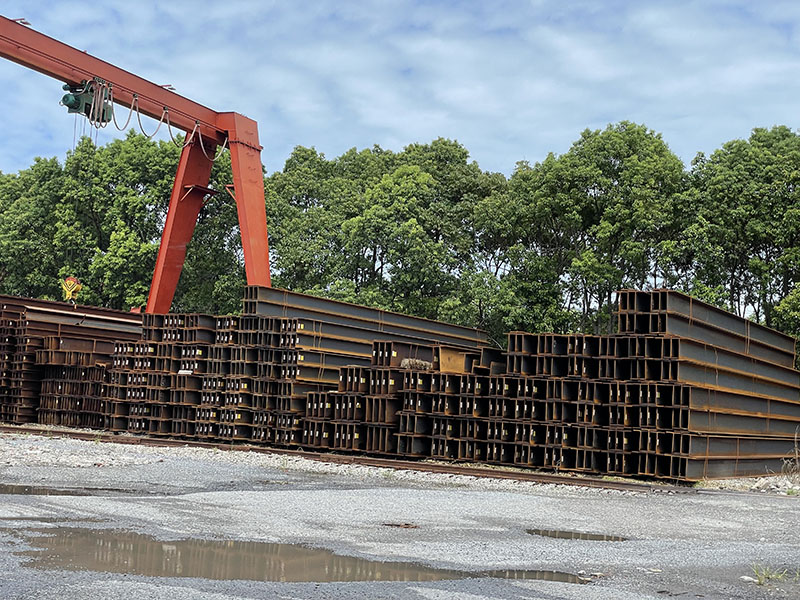Reliable Steel H Beam for Structural Support
The Steel H Beam, a versatile and essential component for a wide range of construction and engineering projects. This product is designed to provide superior structural support and stability, making it an ideal choice for various applications in the construction industry.

Understanding Steel H Beam
1. Steel H beam is inner and outer sides of the flange are parallel or nearly parallel, and the end of the flange is at a right angle. This design makes H-beams have strong bending resistance, simple construction, cost savings, and lightweight structure in all directions.
2. Steel H beam is Wide flange, thin web, multiple specifications, flexible use, suitable for various truss structures, can save 15% to 20% of metal.
3. Due to the parallel inner and outer sides of its wing edges and the right angle of the edge ends, it is easy to assemble and combine into various components, which can save about 25% of welding and riveting work, greatly accelerate the construction speed of the project, and shorten the construction period.
Benefits of Steel H Beam
1. Economically reasonable cross-sectional shape: The cross-sectional design of H-beams results in good mechanical properties. During rolling, the points on the cross-section extend evenly and the internal stress is low. This design makes H-beams more structurally reasonable and economical.
2. Lightweight and metal saving: Compared with ordinary I-beams, H-beams have the characteristics of large cross-sectional coefficient and lightweight, which not only saves metal materials, but also saves 10-15% of metal under the same bearing conditions.
3. Flexible design style: In the case of the same beam height, H-beams make the opening of steel structures 50% larger than that of concrete structures, providing greater flexibility for architectural design.
4. Lightweight structure: The structural weight of H-beams is lighter than that of concrete structures, which reduces the internal forces in structural design, lowers the requirements for foundation treatment of building structures, simplifies the construction process, and reduces costs.
5. High structural stability: Steel structures mainly made of hot-rolled H-beams have high plasticity and flexibility, high structural stability, and are particularly suitable for building structures that can withstand large vibration and impact loads, with strong resistance to natural disasters.
6. Increase the effective usable area of the structure: Due to the small cross-sectional area of steel structure columns, compared with concrete structures, it can increase the effective usable area of the building. Depending on different building forms, it can increase the effective usable area by 4-6%.
7. Save labor and materials: Using H-beams can significantly save labor and materials, reduce the consumption of raw materials, energy, and labor, while also having low residual stress and good appearance and surface quality.
8. Easy to machine and install: H-beams are easy to connect and install structurally, as well as to dismantle and reuse, which helps improve construction efficiency and reduce maintenance costs.
9. Environmental Protection: The use of H-beams helps to protect the environment, mainly reflected in reducing construction noise and dust, minimizing land resource damage, reducing concrete usage, and solid waste generation.
Applications of Steel H Beam
Steel H beam has a wide range of applications, mainly used for:
Various civil and industrial building structures
Various large-span industrial plants and modern high-rise buildings, especially those located in areas with frequent seismic activity and under high-temperature working conditions. At present, the relevant information has been updated, you can check the information website for business news.
Large bridges with high load-bearing capacity, good cross-sectional stability, and large spans are required
Heavy equipment, highways, ship skeletons, mine support, foundation treatment, and dam engineering
Various machine components
Conclusion
H-beams are widely used in various building structures due to their excellent mechanical properties, economy, ease of construction, and environmental friendliness. H-beam is an economical and efficient profile with a more optimized cross-sectional area distribution and a more reasonable strength to weight ratio, named after its cross-section that is the same as the English letter “H”. Due to the right angle arrangement of various parts of H-beams, they have the advantages of strong bending resistance, simple construction, cost savings, and lightweight structure in all directions, and have been widely used.